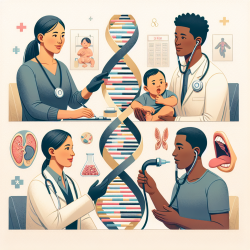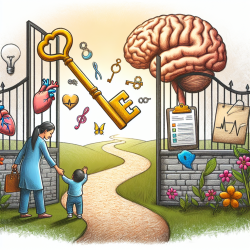In the evolving landscape of public health, rare diseases (RDs) often remain on the periphery due to their low prevalence. However, a recent research article titled "Integrating rare disease management in public health programs in India: exploring the potential of National Health Mission" offers invaluable insights into how existing public health frameworks can be leveraged to improve RD management. As a practitioner, here are some key takeaways and actionable strategies to enhance your skills and impact.
Leveraging NHM Programs for RD Management
The National Health Mission (NHM) in India, particularly its Reproductive, Maternal, Newborn, Child, and Adolescent Health (RMNCH+A) initiatives, provides a comprehensive framework that can be expanded to address RDs effectively. Here’s how:
Primary Prevention
- Reproductive Health: Early detection of pregnancies through NHM Pregnancy Testing Kits can help monitor high-risk cases with a history of RDs.
- Maternal Health: Programs like Janani Shishu Suraksha Karyakram (JSSK) offer antenatal care, nutritional counseling, and infection prevention, crucial for preventing congenital anomalies.
- High-Risk Pregnancy Monitoring: Pradhan Mantri Surakshit Matritva Abhiyan (PMSMA) uses technologies like ultrasound to detect structural anomalies early.
Secondary Prevention: Screening and Early Identification
- Newborn Screening: Rashtriya Bal Swasthya Karyakram (RBSK) screens children for 30 conditions, enabling early identification and intervention.
- Home-Based Care: Programs like Home-Based Newborn Care (HBNC) and Home-Based Care for Young Child (HBYC) involve ASHAs in regular health checks, crucial for early detection of developmental delays and deficiencies.
Diagnosis
Early diagnosis is often a challenge in RD management. District Early Intervention Centres (DEICs) under RBSK provide multidisciplinary diagnostic services, although they require further resource enhancement for exact RD diagnosis.
Treatment and Management
- Facility-Based Newborn Care: Special Newborn Care Units (SNCUs) and other NHM facilities can be expanded to treat Group 1 and Group 2 RDs requiring corrective surgery or dietary management.
- Limited Scope: Current NHM programs have limited capacity for lifelong treatment of RDs, emphasizing the need for dedicated RD management programs.
Rehabilitation and Supplementary Services
Programs like Janani Suraksha Yojana (JSY) and JSSK reduce out-of-pocket expenses, while RBSK provides rehabilitation services, disability certificates, and inclusive education opportunities for children with RDs.
Data Collection and Surveillance
The lack of epidemiological data is a significant barrier in RD management. NHM’s various data collection initiatives can be integrated to create a comprehensive National Rare Disease Registry, aiding in better policy formulation and resource allocation.
Moving Forward: Recommendations for Practitioners
- Raise Awareness: Conduct awareness campaigns and integrate RD training in medical education to improve early detection and reduce stigma.
- Strengthen Referral Services: Develop a robust referral mechanism linking Primary Healthcare Providers (PHPs), DEICs, and Centres of Excellence (CoEs).
- Genetic Diagnosis: Focus on targeted genetic screening for high-risk pregnancies and integrate genetic services with existing RD frameworks.
- Unified Surveillance System: Advocate for a unified health surveillance system that links various health records, enhancing real-time data capture and monitoring.
To read the original research paper, please follow this link: Integrating rare disease management in public health programs in India: exploring the potential of National Health Mission.










